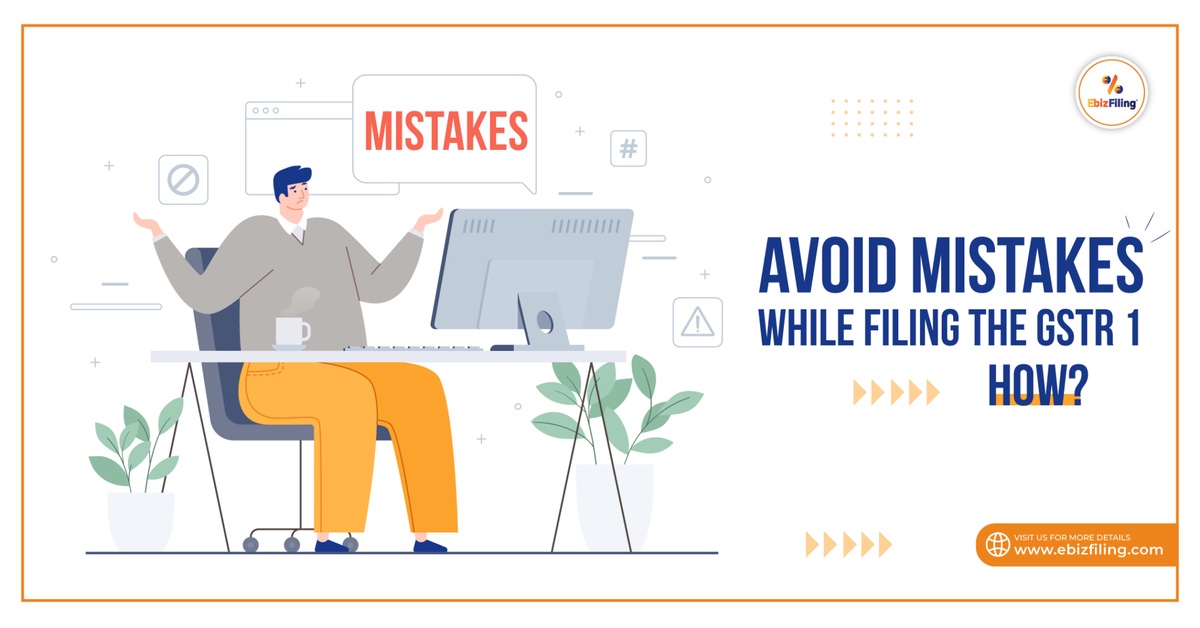Introduction
In India, a comprehensive indirect tax known as the Goods and Services Tax (GST) is imposed on the provision of goods and services. Every person who has registered for GST is expected to submit a number of reports, including GSTR 1, a monthly or quarterly report that includes information on all outbound supplies made during the specified time. Businesses could find it challenging to submit GSTR 1 and other GST returns, and any errors in the GST filing could result in penalties and legal implications. We will go over the errors to avoid when submitting GSTR 1 in this article.
What errors should be avoided when submitting GSTR 1?
Several errors should be avoided when submitting GSTR 1. Following is a list of some of them:
1) Incomplete or incorrect data
The most frequent error made when filing GSTR 1 is giving false or incomplete information. This can cause inconsistencies in the return, which might get it rejected or get it under the authorities’ inspection. To prevent this, firms should make sure that all information about outward supply, such as the recipient’s name, address, and GSTIN, the goods’ or services’ HSN code, as well as the amount, price, and tax rate, is put accurately in the return.
2) Late GSTR 1 filing
Businesses also frequently file GSTR 1 after the deadline, which is another error. Penalties, interest, and possibly the cancellation of the registration may result from late GSTR 1 filing. Businesses should be sure to file the return by the deadline, which is the 11th of the month after the return is due for monthly filers and the 13th of the month after the return is due for quarterly filers, in order to prevent this.
3) Lack of data reconciliation
Businesses should make sure the information on the GSTR 1 corresponds to the books of accounts. Any data inconsistencies could cause problems during audits and inspections. Businesses should routinely reconcile the information in the GSTR 1 with their books of accounts to prevent this.
4) Debit and credit notes not being reported
Businesses also frequently err by neglecting to report credit notes and debit notes in the GSTR 1. Debit notes are issued when the value of the outgoing supplies increases, whereas credit notes are issued when the value of the outgoing supplies decreases. Debit and credit notes must be reported accurately to avoid errors in the return, fines, and legal ramifications. Businesses must make sure that all credit notes and debit notes are accurately documented in the GSTR 1 in order to prevent this.
5) Not reporting nil returns
Companies who didn’t produce any supplies for sale throughout the time should nevertheless submit a nil return. Penalties and legal problems may result from failure to comply. Businesses should be careful to file a nil return if they did not make any outward supplies throughout the period in order to prevent this.
6) Not reporting exports and deemed exports
The taxes paid on the inputs used to produce the goods or services can be refunded on exports and considered exports, which are zero-rated supply. Losing the refund is possible if exports and considered exports are not reported in the GSTR 1. Businesses should make sure to accurately record and deem exports in the return in order to prevent this.
7) Not reporting advances received
Advance payments made for the provision of goods or services must be disclosed in the GSTR 1. The return may be incorrect if advances are not reported, which could result in fines and other legal repercussions. Businesses should take care to accurately declare advances received in the return in order to avoid this.
8) Failing to file amendments
Businesses may be required to modify the GSTR 1 for a number of reasons, including erroneous information, changes to the recipient’s information, or termination of the supply. For businesses, not filing can have a variety of negative effects. Businesses must make sure that all of their sales data is submitted accurately and on time in GSTR 1 in order to avoid any penalties or compliance difficulties.
Conclusion
Businesses must take care to prevent frequent errors while filing GST Returns in order to avoid penalties and fines. The blunders listed above are a few of the most frequent ones that companies make when submitting GSTR 1. Businesses can simplify the tax system by avoiding these errors and making sure accurate and comprehensive information is entered into GSTR 1.


No comments yet